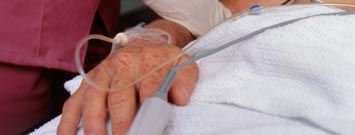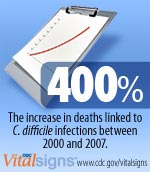Vital Signs: Stop C. difficile Infections
 People on antibiotics can get C. difficile, a germ that causes diarrhea serious enough to kill.
People on antibiotics can get C. difficile, a germ that causes diarrhea serious enough to kill.
C. difficile is a germ that causes diarrhea and other intestinal problems linked to 14,000 U.S. deaths annually. C. difficile infections cost at least $1 billion in extra health care costs annually. However, a new CDC report shows that C. difficile is not just a problem in hospitals – it is a patient safety issue in all types of medical facilities including hospitals, nursing homes, and outpatient facilities. Fortunately, the report also shows that some hospitals are showing success in preventing C. difficile infections.
When a person takes antibiotics, good germs that protect against infection are destroyed for several months. During this time, people getting medical care can get sick from C. difficile if the germ is spread to them from contaminated surfaces, such as sinks, or from health care providers' hands.
C. difficile infection rates remain at historic highs.
While rates of many other health care associated infections have declined, hospital stays caused by C. difficile infections tripled in the previous decade. It remains one of the most concerning patient safety threats today, especially to adults. Infection risk rises with age; almost half of infections occur in people younger than 65, however, more than 90% of C. difficile deaths occur in people 65 and older.
C. difficile is a problem in all types of medical facilities – even nursing homes and outpatient clinics.
C. difficile germs move with patients from one medical facility to another, potentially spreading infection to other patients. Unnecessary antibiotic use in patients at one facility can increase the chance for C. difficile infections in another facility when patients transfer. Health care providers are not always told that a patient has or recently had C. difficile infection when they transfer; therefore, they might not take the right actions to prevent spread.
C. difficile infections in medical facilities can be prevented.
Some hospitals are showing early success in reducing C. difficile infections. Projects in three states have shown about 20% fewer hospital-onset C. difficile infections after less than two years of dedicated infection control programs.
 For Clinicians: 6 Steps for Prevention
For Clinicians: 6 Steps for Prevention
- Prescribe and use antibiotics carefully. About 50% of all antibiotics given are not needed, unnecessarily raising the risk of C. difficile infections.
- Test for C. difficile when patients have diarrhea while on antibiotics or within several months of taking them.
- Isolate C. difficile patients immediately.
- Wear gloves and gowns when treating C. difficile patients, even during short visits. Hand sanitizer does not kill C. difficile, and hand washing may not be sufficient.
- Clean room surfaces with bleach or another EPA-approved, spore-killing disinfectant after a patient with a C. difficile infection has been treated there.
- When a patient transfers, notify the new facility if a patient has a C. difficile infection.
As a patient, you can:
- Take antibiotics only as prescribed by your doctor. Antibiotics can be lifesaving medicines.
- Tell your doctor if you have been on antibiotics and get diarrhea within a few months.
- Wash your hands after using the bathroom.
- Try to use a separate bathroom if you have diarrhea, or be sure the bathroom is cleaned well if someone with diarrhea has used it.
More Information
- CDC Vital Signs Report: Stop C. difficile Infections
- CDC MMWR on C. difficile infections
- CDC’s C. difficile website
- Infection control recommendations
- Environmental cleaning toolkit and checklist
- C. difficile infection prevention toolkit
- SHEA-IDSA Clinical Practice Guidelines
- For healthcare providers: FAQs about C. difficile
- CDC Vital Signs Audio Podcast: Stop C. difficile infections
- CDC Medscape Video Commentary: Testing for Clostridium difficile infection
- Tracking C. difficile infection
On Other Web Sites
- MedlinePlus - Infection Control
- MedlinePlus - Patient Safety
- MedlinePlus - MRSA
- MedlinePlus - Clostridium difficile Infections
CDC works 24/7 saving lives and protecting people from health threats to have a more secure nation. A US federal agency, CDC helps make the healthy choice the easy choice by putting science and prevention into action. CDC works to help people live longer, healthier and more productive lives.
Get email updates
To receive email updates about this page, enter your email address:
Contact Us:
- Centers for Disease Control and Prevention
1600 Clifton Rd
Atlanta, GA 30333 - 800-CDC-INFO
(800-232-4636)
TTY: (888) 232-6348 - Contact CDC-INFO




